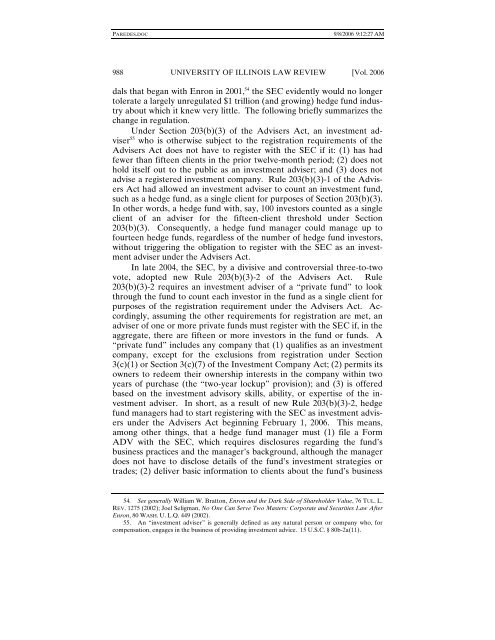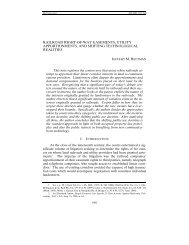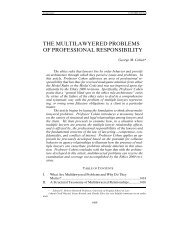on the decision to regulate hedge funds - University of Illinois Law ...
on the decision to regulate hedge funds - University of Illinois Law ...
on the decision to regulate hedge funds - University of Illinois Law ...
You also want an ePaper? Increase the reach of your titles
YUMPU automatically turns print PDFs into web optimized ePapers that Google loves.
PAREDES.DOC<br />
9/8/2006 9:12:27 AM<br />
988 UNIVERSITY OF ILLINOIS LAW REVIEW [Vol. 2006<br />
dals that began with Enr<strong>on</strong> in 2001, 54 <strong>the</strong> SEC evidently would no l<strong>on</strong>ger<br />
<strong>to</strong>lerate a largely un<strong>regulate</strong>d $1 trilli<strong>on</strong> (and growing) <strong>hedge</strong> fund industry<br />
about which it knew very little. The following briefly summarizes <strong>the</strong><br />
change in regulati<strong>on</strong>.<br />
Under Secti<strong>on</strong> 203(b)(3) <strong>of</strong> <strong>the</strong> Advisers Act, an investment adviser<br />
55 who is o<strong>the</strong>rwise subject <strong>to</strong> <strong>the</strong> registrati<strong>on</strong> requirements <strong>of</strong> <strong>the</strong><br />
Advisers Act does not have <strong>to</strong> register with <strong>the</strong> SEC if it: (1) has had<br />
fewer than fifteen clients in <strong>the</strong> prior twelve-m<strong>on</strong>th period; (2) does not<br />
hold itself out <strong>to</strong> <strong>the</strong> public as an investment adviser; and (3) does not<br />
advise a registered investment company. Rule 203(b)(3)-1 <strong>of</strong> <strong>the</strong> Advisers<br />
Act had allowed an investment adviser <strong>to</strong> count an investment fund,<br />
such as a <strong>hedge</strong> fund, as a single client for purposes <strong>of</strong> Secti<strong>on</strong> 203(b)(3).<br />
In o<strong>the</strong>r words, a <strong>hedge</strong> fund with, say, 100 inves<strong>to</strong>rs counted as a single<br />
client <strong>of</strong> an adviser for <strong>the</strong> fifteen-client threshold under Secti<strong>on</strong><br />
203(b)(3). C<strong>on</strong>sequently, a <strong>hedge</strong> fund manager could manage up <strong>to</strong><br />
fourteen <strong>hedge</strong> <strong>funds</strong>, regardless <strong>of</strong> <strong>the</strong> number <strong>of</strong> <strong>hedge</strong> fund inves<strong>to</strong>rs,<br />
without triggering <strong>the</strong> obligati<strong>on</strong> <strong>to</strong> register with <strong>the</strong> SEC as an investment<br />
adviser under <strong>the</strong> Advisers Act.<br />
In late 2004, <strong>the</strong> SEC, by a divisive and c<strong>on</strong>troversial three-<strong>to</strong>-two<br />
vote, adopted new Rule 203(b)(3)-2 <strong>of</strong> <strong>the</strong> Advisers Act. Rule<br />
203(b)(3)-2 requires an investment adviser <strong>of</strong> a “private fund” <strong>to</strong> look<br />
through <strong>the</strong> fund <strong>to</strong> count each inves<strong>to</strong>r in <strong>the</strong> fund as a single client for<br />
purposes <strong>of</strong> <strong>the</strong> registrati<strong>on</strong> requirement under <strong>the</strong> Advisers Act. Accordingly,<br />
assuming <strong>the</strong> o<strong>the</strong>r requirements for registrati<strong>on</strong> are met, an<br />
adviser <strong>of</strong> <strong>on</strong>e or more private <strong>funds</strong> must register with <strong>the</strong> SEC if, in <strong>the</strong><br />
aggregate, <strong>the</strong>re are fifteen or more inves<strong>to</strong>rs in <strong>the</strong> fund or <strong>funds</strong>. A<br />
“private fund” includes any company that (1) qualifies as an investment<br />
company, except for <strong>the</strong> exclusi<strong>on</strong>s from registrati<strong>on</strong> under Secti<strong>on</strong><br />
3(c)(1) or Secti<strong>on</strong> 3(c)(7) <strong>of</strong> <strong>the</strong> Investment Company Act; (2) permits its<br />
owners <strong>to</strong> redeem <strong>the</strong>ir ownership interests in <strong>the</strong> company within two<br />
years <strong>of</strong> purchase (<strong>the</strong> “two-year lockup” provisi<strong>on</strong>); and (3) is <strong>of</strong>fered<br />
based <strong>on</strong> <strong>the</strong> investment advisory skills, ability, or expertise <strong>of</strong> <strong>the</strong> investment<br />
adviser. In short, as a result <strong>of</strong> new Rule 203(b)(3)-2, <strong>hedge</strong><br />
fund managers had <strong>to</strong> start registering with <strong>the</strong> SEC as investment advisers<br />
under <strong>the</strong> Advisers Act beginning February 1, 2006. This means,<br />
am<strong>on</strong>g o<strong>the</strong>r things, that a <strong>hedge</strong> fund manager must (1) file a Form<br />
ADV with <strong>the</strong> SEC, which requires disclosures regarding <strong>the</strong> fund’s<br />
business practices and <strong>the</strong> manager’s background, although <strong>the</strong> manager<br />
does not have <strong>to</strong> disclose details <strong>of</strong> <strong>the</strong> fund’s investment strategies or<br />
trades; (2) deliver basic informati<strong>on</strong> <strong>to</strong> clients about <strong>the</strong> fund’s business<br />
54. See generally William W. Bratt<strong>on</strong>, Enr<strong>on</strong> and <strong>the</strong> Dark Side <strong>of</strong> Shareholder Value, 76 TUL. L.<br />
REV. 1275 (2002); Joel Seligman, No One Can Serve Two Masters: Corporate and Securities <strong>Law</strong> After<br />
Enr<strong>on</strong>, 80 WASH. U. L.Q. 449 (2002).<br />
55. An “investment adviser” is generally defined as any natural pers<strong>on</strong> or company who, for<br />
compensati<strong>on</strong>, engages in <strong>the</strong> business <strong>of</strong> providing investment advice. 15 U.S.C. § 80b-2a(11).




